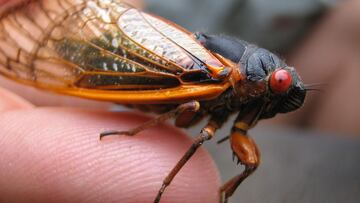What is a zombie cicada? Strange fungus makes insects hyper-sexual
Cicadas will emerge in the billions in the United States this spring. Some of these insects might become zombie cicadas with no control over their bodies.


This is a special year for cicadas- insects that emerge from the ground during certain cyclical periods- as two broods will be emerging this spring.
Different broods of cicadas emerge in specific geographic regions at regular intervals, often every 13 or 17 years, depending on the species. This spring, both the 13-year and the 17-year broods will come out of the ground, arriving in parts of the United States in numbers that the country has not witnessed in decades.
While cicadas can be loud and may be considered a nuisance by some people due to the noise generated by their distinctive buzzing and clicking sounds to attract mates, they do not pose a direct threat to humans. These insects do not sting or bite, and they are not known to transmit diseases to people.
The bugs may not be dangerous to humans, but they themselves might be under attack. Scientists are concerned that some of them will turn into so-called zombie cicadas because of a manipulative, behavior-changing fungus.
READ ALSO: Will there be a bird flu pandemic among humans?
Entomologists are asking the public to report sightings of cicadas infested with the parasite Massospora cicadina, better known as the zombie cicada fungus. https://t.co/WiVEFNEv0x
— Gizmodo (@Gizmodo) May 10, 2024
What is a zombie cicada?
A strange fungus known as the Massospora cicadina attacks the bugs, taking over their bodies and behavior. The cicadas emerge from the soil with the goal of procreating, but the fungus makes them unable to achieve this objective.
At some point during the insects’ life cycle, spores of this fungus can enter their bodies, and a mass of these spores grows inside their abdomen. The fungus will cause the backside of the abdomen to erupt and a chalky, white plug to come out, causing the insect’s genitals to fall off. The plug then replaces a third of the cicada’s body.
READ ALSO: What is a geomagnetic storm and how does it affect the Earth?
Related stories
According to National Geographic, the disemboweled cicadas will fly around and spores will flake off from these plugs, in a manner similar to a tipped saltshaker, giving them the nickname “saltshakers of death”.
The fungus manipulates the behavior of the insects, causing them to be hypersexualized, even though they can no longer reproduce. Infected male bugs will attempt to mate with females and try to attract males as well by pretending to be females. This is because the spores change the cicada’s behavior so as to infect others and maximize the spread of the fungus.


Complete your personal details to comment